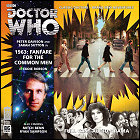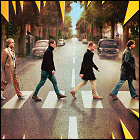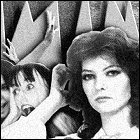 The Doctor tries to take Nyssa to 1963 to show her the heyday of Beatlemania, only to find that another band, the Common Men, has taken the Beatles’ place in history. Worse yet, as the Doctor and Nyssa stand in the screaming crowd awaiting the Common Men’s arrival, they see someone in the crowd with a gun. The Doctor warns the band while Nyssa tries to disarm the shooter, only to find that he has a weapon that’s definitely not from 1963, definitely not from Earth, and he also has a time transporter which he uses to escape, taking Nyssa with him. Trying to find out what’s going on, the Doctor befriends the band and a fan named Rita, with whom he witnesses several incidents of the band’s fans taking their devotion to dangerous levels. Nyssa, in the meantime, also finds herself in the company of the Common Men, at a different point in their career. As she awaits rescue via TARDIS, she also meets Lenny Kruger, a man determined to manage the Common Men’s careers. It turns out that he’s an alien (but then, so are the boys in the band), and he hopes to harness the power of their popularity for something beyond mere show business. The Doctor, determined to restore the Fab Four to their rightful place in history, is an obstacle to Kruger’s plans, one which Kruger wants to remove by any means necessary.
The Doctor tries to take Nyssa to 1963 to show her the heyday of Beatlemania, only to find that another band, the Common Men, has taken the Beatles’ place in history. Worse yet, as the Doctor and Nyssa stand in the screaming crowd awaiting the Common Men’s arrival, they see someone in the crowd with a gun. The Doctor warns the band while Nyssa tries to disarm the shooter, only to find that he has a weapon that’s definitely not from 1963, definitely not from Earth, and he also has a time transporter which he uses to escape, taking Nyssa with him. Trying to find out what’s going on, the Doctor befriends the band and a fan named Rita, with whom he witnesses several incidents of the band’s fans taking their devotion to dangerous levels. Nyssa, in the meantime, also finds herself in the company of the Common Men, at a different point in their career. As she awaits rescue via TARDIS, she also meets Lenny Kruger, a man determined to manage the Common Men’s careers. It turns out that he’s an alien (but then, so are the boys in the band), and he hopes to harness the power of their popularity for something beyond mere show business. The Doctor, determined to restore the Fab Four to their rightful place in history, is an obstacle to Kruger’s plans, one which Kruger wants to remove by any means necessary.
written by Eddie Robson
directed by Barnaby Edwards
music by Howard CarterCast: Peter Davison (The Doctor), Sarah Sutton (Nyssa), Mitch Benn (Mark Carville), Andrew Knott (James O’Meara), David Dobson (Korky Goldsmith), Ryan Sampson (Lenny Kruger), Alison Thea-Skot (Rita/Sadie), Jonty Stephens (Paravatar)
Notes: The Common Men – at least, the Common Men as history should recall them – were mentioned in the very first episode of Doctor Who, An Unearthly Child, and in the course of restoring history, the Doctor very specifically puts them on course to be the one-hit wonders mentioned by Ian Chesterton in that episode. The Doctor recalls that Susan used to listen to one of their records in the TARDIS and that his first incarnation “didn’t like it.” The Doctor mentions the Ferutu, time-sensitive beings encountered by the fifth Doctor and his early lineup of companions in the Missing Adventures novel Cold Fusion, published in 1996.
LogBook entry and TheatEar review by Earl Green
Review: A loving tip of the hat to that other craze that swept the U.K. alongside Dalekmania, Fanfare For The Common Men is a story that’s as much about the Beatles as it is about the Common Men. The completely fictional, almost-sound-alike band that’s plugged into the Beatles’ slot in Earth’s cultural history is entertaining, with comedian Mitch Benn and company skillfully emulating-but-never-quite-copying the Fab Four, complete with Liverpudlian accents and the irreverent attitudes for which the Beatles were known. The new characters are  skillfully constructed – things never quite dip to the point that the whole thing’s in danger of becoming a Rutles-esque parody.
skillfully constructed – things never quite dip to the point that the whole thing’s in danger of becoming a Rutles-esque parody.
And if you’re going to touch upon the topic of Beatlemania, complete with a largely female fan following screaming so loud that the band can barely be heard, you can’t pick a better Doctor/companion combination than the fifth Doctor and Nyssa, both so reserved and un-screamy that they stick out like a sore thumb in such scenes as the opening moments of part one. Without having to be signposted, the sheer juxtaposition involved is part of the story’s humor.
For anyone steeped in Beatles lore, this story is a treat. Though the specifics have to be changed to account for the alterations to the timeline, there are parodies of everything from the Beatles picking the wrong manager in the wake of Brian Epstein’s death, to Lennon’s infamous and poorly-judged “bigger than Jesus” comment, to the “Paul is dead” conspiracy theory, that it’s hard not to get a chuckle. The original songs are nicely done Beatles pastiche, without being parodies – again, it would’ve been all too easy to “go Rutles” with Fanfare, so the restraint on the part of the writer and producers is impressive. (For those who dig them that much, the songs are included, free from any story dialogue, in their own bonus track.)
All of this adds up to a story that makes it easy to let your guard down and enjoy the freewheeling atmosphere that it creates, so when  things begin to get dark in the third episode, it truly does pack a surprising punch. Also surprising is the retinue of guest characters that are built up to near-companion status, and the fact that restoring the timeline actually seems to leave them in less impressive shape. One character, in the altered history, develops a burgeoning career that provides her with connections and abilities that are vital to resolving the story; once the Doctor returns the Common Men to one-hit-wonder obscurity, that character resumes her original shape: just another screaming fan. This revelation leaves a surprisingly bittersweet taste.
things begin to get dark in the third episode, it truly does pack a surprising punch. Also surprising is the retinue of guest characters that are built up to near-companion status, and the fact that restoring the timeline actually seems to leave them in less impressive shape. One character, in the altered history, develops a burgeoning career that provides her with connections and abilities that are vital to resolving the story; once the Doctor returns the Common Men to one-hit-wonder obscurity, that character resumes her original shape: just another screaming fan. This revelation leaves a surprisingly bittersweet taste.
Fanfare For The Common Men is a promising kick-off for a trilogy of stories celebrating not the origins of Doctor Who, but rather the era that birthed the series.
